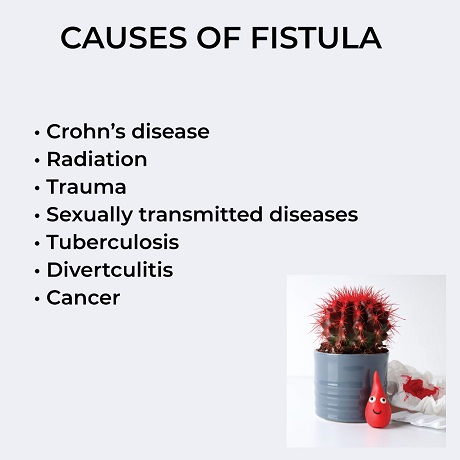Anal fistulas and anal cancer are two distinct conditions with different causes.
Anal Fistula Causes: Anal fistulas are abnormal tunnels that form between the anal canal and the surrounding skin. They usually develop as a result of an anal abscess, which is a collection of pus caused by an infection in the anal gland. The abscess can lead to the formation of a tunnel that doesn’t heal on its own. The most common causes of anal fistulas include:
Anal Abscess: An untreated or poorly treated anal abscess can evolve into an anal fistula.
Inflammatory Bowel Disease: Conditions like Crohn’s disease and ulcerative colitis, which cause chronic inflammation in the digestive tract, can increase the risk of developing anal fistulas.
Infection: Infections in the anal area can contribute to the formation of anal fistulas.
Trauma or Injury: Injury or trauma to the anal area, such as during childbirth or surgical procedures, can result in the development of anal fistulas.
Certain Medical Conditions: Conditions that affect the immune system, such as HIV/AIDS, can weaken the body’s ability to fight infections, making individuals more susceptible to anal fistulas.
Anal Cancer Causes: Anal cancer is a rare form of cancer that affects the tissues of the anus. While the exact cause of anal cancer is unknown, certain factors have been associated with an increased risk of developing this condition:
Human Papillomavirus (HPV) Infection: Persistent infection with certain types of HPV, particularly HPV-16 and HPV-18, is a significant risk factor for developing anal cancer.
Weakened Immune System: Individuals with weakened immune systems, such as those with HIV/AIDS or those who have undergone organ transplantation and take immunosuppressant medications, have a higher risk of developing anal cancer.
Smoking: Smoking tobacco increases the risk of developing various types of cancer, including anal cancer.
Anal Intercourse: Engaging in receptive anal intercourse without proper protection can increase the risk of developing anal cancer, as it can facilitate the transmission of HPV.
It is important to note that anal fistulas and anal cancer are distinct conditions with different causes, symptoms, and treatments. If you have concerns about your health, it is recommended to consult with a healthcare professional for an accurate diagnosis and appropriate medical guidance.







